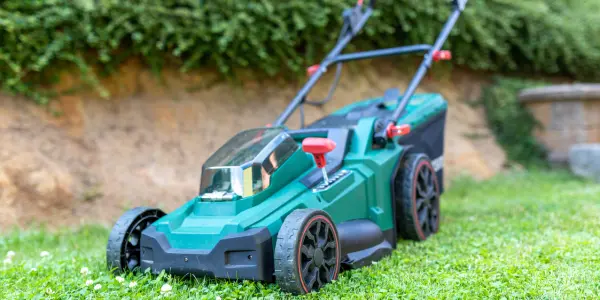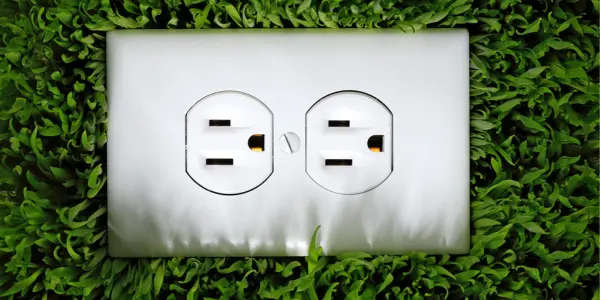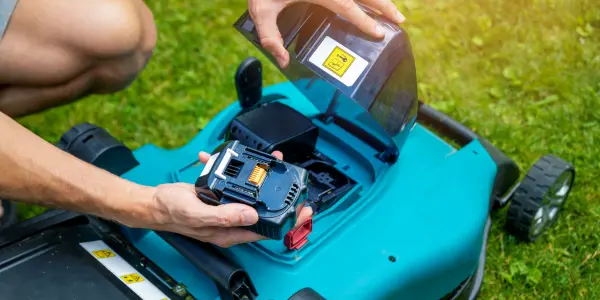Hello homeowners, Are you caught in the puzzle of deciding between a gas lawn mower vs a battery mower? Trust me, I’ve been there. It’s common to wonder which option will best suit your lawn care needs. Each type of mower has its own set of advantages and drawbacks, and understanding these differences is crucial for selecting the right one for your lawn. I will share my insights into the comparison between gas and battery lawn mowers to help you navigate this decision with more confidence.

Do Electric Mowers Cut Better Than Gas?
For the majority of homeowners, the 3 most important factors to consider when selecting a lawn mower are the quality of cut it delivers, along with its cutting width, and its ability to handle thick grass. Both gas and battery powered mowers are capable of achieving good results, but there are some differences to take into account.
✅The Mulching
In my opinion, both battery and gas mowers are very good at bagging and trimming grass, However, their performance may differ when it comes to mulching, as mulching blades demand greater engine power to operate efficiently. Gas powered mowers offer superior power, giving them a slight edge over battery operated ones. but now a days, technological advancements in battery powered mowers might reduce this gap.
One more thing you can take into account is how well the mower mulches. As compared to battery powered mowers, gas mowers could feature more durable mulching systems with customizable discharge options and blade heights.
✅Cutting Width
In comparison to cutting widths, gas mowers may offer larger cutting widths, allowing you to cover more ground with each pass, while battery mowers may be more compact for maneuvering in tight spaces. Yes, you can get a battery powered mower with a wide cutting width, but price plays a part here!
✅The Stronger, The Better
As you know, gas powered mowers, fueled by internal combustion engines, can generate more torque, allowing them to handle tougher mulching tasks with ease. On the other hand, battery power mowers depend on electric motors and have little lower power output but yes, they are much quieter!
The performance of a gas lawnmower is also influenced by the quality and type of gas it uses. For more guidance, check out “Selecting the Right Gas for Your Lawn Mower“
Let’s Consider More Factors!
If you are reading so far, it means you still need more research to do. I know that beyond cut quality, several other factors come into play when comparing gas and battery lawn mowers. So let’s look deeper into these aspects to gain more understanding.
➡️Starting Up Engine
If you find it difficult to start a gas-powered mower’s engine by pulling a cord, an electric mower can be a more convenient option for you, as it only requires the push of a button and produces no noise.

➡️Performance Under Pressure
When you’re out mowing the lawn for real, gas mowers are great at tackling tough, thick grass without breaking a sweat, which makes them perfect for big lawns or tricky spots. On the other hand, battery powered mowers are awesome because they’re easier to move around and can be easily handled since they’re lighter and more compact.
➡️Availability of Fuel
Gasoline is widely available, but you may need to make trips to the gas station to refuel your mower. Battery mowers can be charged at home using a standard electrical outlet. Super easy, right?

➡️Portability
Gas mowers typically require more effort to transport due to their heavier weight and the need to carry fuel. Battery mowers are generally lighter and easier to maneuver, making them a better choice for users with limited strength or mobility. Let me tell you, as my mother-in-law is using a battery powered mower, because she is aged and living alone, it might be difficult for her to carry that weight from the garage to her lawn, so again, your choice depends on your needs.

➡️Electric Outlets Near Me
For battery mowers, consider the availability of charging stations or electrical outlets near your lawn area. Ensure that you have easy access to a power source for charging the mower, especially if you have a large yard, then limited access to electrical outlets might be a problem.
➡️Smart Features
If you are a fan of technology, then some modern battery powered mowers come with smart features such as app connectivity, GPS tracking, programmable schedules, and self-diagnostic tools. Probably these types of smart robotic features can be found in battery powered mowers.
Gas Lawn Mower Complaints
Now, before making up your mind, let’s look at the common complaints that most homeowners encounter with gas powered mowers.
Pollution And Environmental Impact
Gas mowers emit harmful pollutants like carbon monoxide and nitrogen oxides, contributing to air pollution and environmental degradation
Noise Pollution
Gas mowers are notorious for their loud operation, disrupting the peace and quiet in residential areas and outdoor spaces, especially if you want to use a mower at night.
Mower Maintenance
Let me tell you that maintaining a gas-powered mower to run smoothly might be a hassle for you. From changing oil and air filters to cleaning spark plugs and carburetors, it can be time consuming and require labour. especially after a period of storage, you might find yourself frustrated with the frequent need for tune ups and repairs, as well as the cost of it.
Smell
Some people may not mind the smell of gasoline, but others find it unpleasant. Gas mowers emit fumes that can linger in the air, leaving behind a distinct odor that some people might not like and detracting from the overall mowing experience.
Cost
As I mentioned before, operating a gas lawn mower can be expensive, with costs associated with fuel, maintenance, and repairs. Gasoline prices fluctuate, and filling up a mower’s tank can add up over time.
Battery Lawn Mower Complaints
Before we conclude, let’s ensure we address any concerns regarding battery powered mowers thoroughly.

Limited Battery Life
One of the biggest complaints about battery powered lawn mowers is their limited battery life, which can be a great inconvenience for some people, especially with larger yards or extensive mowing needs.
Many battery mowers have runtimes ranging from 30 minutes to an hour on a single charge, which may not be sufficient for completing larger mowing jobs without interruptions. You might need to recharge mid-mow, which can disrupt your workflow and extend the overall time spent on lawn mowing tasks.
Performance On Tough Terrain
As I previously mentioned, battery mowers can be difficult to operate in difficult conditions, such as dense grass or hills. Technology is advancing, but there are still gaps that need to be closed.
Dependency On Weather Conditions
Electric mowers are vulnerable to weather conditions, especially summer heat, which can effect battery performance and longevity over time. High temperatures can cause batteries to degrade more quickly, reducing their overall lifespan and capacity. Also, in winter, extreme cold can affect battery performance, leading to reduced runtime and power output.
Upfront Cost
While battery-powered mowers offer long-term savings on fuel and maintenance costs, they often come with a higher upfront price tag compared to gas mowers. The initial investment in a quality battery mower may be prohibitive for some users, especially those on a tight budget or looking for a more affordable option. While the cost of electric mowers has decreased in recent years, users should carefully consider their budget and long-term lawn care needs before investing in a battery-powered model.
There is no doubt that a battery mower can save money on fuel and maintenance over the long run. But the initial cost of a high quality electric mower is high, especially if you are on a limited budget or are searching for a less expensive solution. Also, you might need a spare battery, given your mowing needs.
Perceived Fragility
As electric mowers are generally lightweight and easy to maneuver, concerns about their durability and resilience to rough handling or challenging conditions can arise. They have plastic housing, and the components of electric mowers may seem less durable than the metal construction of gas mowers, so longevity is an issue here.
Conclusion
So who wins the race? The choice between a gas powered and battery powered lawn mower depends on your mowing needs and what you prefer. While gas mowers offer superior power and durability, electric mowers provide convenience, environmental benefits, and quieter operation. It’s now your job to consider all the factors, such as cut quality, maintenance requirements, and environmental impact, so you can make a better decision that meets your lawn care needs.

